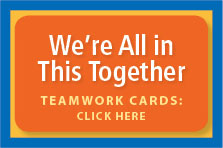One Simple Way to Ensure That Your Team Becomes High Performing

If you are reading this, chances are good that you are currently a member of a team -- either at work, in your community, or as part of a volunteer organization. And if you aren't on a team now, chances are good that, at some time in your life, you were on a team. Yes? I thought so.
In any case, it's more than likely that whatever team you are on, or have been on, has had some challenges along the way.
There were speed bumps, fumbles, breakdowns, lost opportunities, inefficiencies, infighting, power struggles, control issues, boring meetings, personality problems, competing agendas, cliques, triangulation, disappointment, disenchantment, and disillusionment.
You know, real life -- the normal ups and downs of any group of people attempting to join together to accomplish some kind of mutually agreed upon goal.
I have been fascinated by this phenomenon for years and, along the way, have had the good fortune of being a member of quite a few high performing teams, including, in high school, an undefeated, championship soccer team.

Curiously, some people think that just because they're working along side a bunch of other people they're on a team. This is not necessarily true.
What they are thinking of as a "team", may, in fact, merely be a group, club, association, assemblage, aggregation, congregation, gang, crowd, faction, posse, or loose confederation of highly opinionated individuals being paid by the same employer.
A team is different -- requiring a much higher standard of participation and commitment -- not unlike the difference between "dating" and "being married."
Since there are many fine books on this topic (here's my favorite) and I know you only have a few minutes to read this highly informative and action-oriented blog post, I'm going to cut to the chase and focus on just one small component of a high performing team -- one you and your team can do something about immediately.
Agreements.
Yes, agreements. As in operating principles. Norms. Rules of engagement. The collective, verifiable, interpersonal behaviors that you and your teammates can say YES to and abide by that will radically enhance collaboration, communication, and connection.
Most teams operate as if their agreements are in place, but usually they're not. They may be implied, but we all know where implications get us. The same place as good intentions.
So here we go -- a checklist of 25 Team Agreements for your consideration.
I am not suggesting you adopt all of them. What I'm suggesting is that you consider them, find the ones that work for you and, in collaboration with your teammates, create your own set of agreements.
Whatever I've omitted, add. Whatever I've added that's not your cup of tea, omit. Whatever wording is off-base, bothersome, or crude, change. And while some of what's on my list may seem too granular for your taste, know this: Sometimes it's the seemingly "small stuff" that screws everything up -- like the pea under the mattress or adding one too many teaspoons of salt to an already really good pot of soup.
NOTE: I have purposely excluded what I call "Fortune Cookie" statements -- those vague teamwork truisms (sometimes called "values") that can be very important to honor, but are not always translated into action. For example, I could say "be respectful" or "communicate well", but what does that really mean? These kinds of statements can be interpreted in a million different ways. If "respect" is an agreement you want your team to live by -- and a mighty fine one it is -- then frame it in a way that each team member will know what respect looks and sounds like, real time, and will be able to notice when that agreement is either broken or ignored.
READY?

1. Co-create and commit to a compelling vision.
2. Get completely clear about roles and responsibilities. Know who's doing what. And by when.
3. Honor thy commitments.
4. If you realize that you cannot honor a commitment, inform your teammates ASAP and then renegotiate a new commitment.
5. Assume positive intent.
6. Communicate emotionally charged issues on the phone or in person, not in an email.
7. When someone speaks, listen deeply before gearing up to convince them of what you already think.
8. Share your successes with each other
9. Clear the air as quickly as possible whenever there is a breakdown
10. No triangulation! (If someone complains to you about someone else, encourage that person to work it out with the person they are complaining about.)
11. Give and receive feedback.
12. If you need help, ask for it.
13. Show up to meetings on time (and be prepared).
14. Routinely acknowledge and appreciate each other.
15. Be co-responsible. OK, maybe your team has a "leader". Fine. But when the rest of team fails to speak up or act because "they are not the leader", you got problems in River City. Everyone is responsible.
16. Share information freely. (Since, "information is power", the withholding of information is a passive aggressive way in which people wield power over each other).
17. Speak your truth, without attacking or making anyone wrong.
18. Debrief "failures." Together, find the silver lining in every cloud. In other words, learn from mistakes.

19. Create sacred time to have fun together.
20. Begin each day with a 5-minute "morning unity" meeting -- a simple way to make sure everyone is on the same page.
21. Return calls and emails within 24 hours. (If you know you can't return a call or email that quickly, let your teammates know by when you will be able to respond).
22. Share best practices and lessons learned.
23. Celebrate progress (small wins).
24. Be willing to say NO if there is something you are not willing to do (rather than seeming to agree and then, simply, not doing it).
25. Check for understanding before ending a meeting or phone call. Translation? Summarize what you think the agreement or action is -- and invite others to either confirm your understanding or modify it in some way -- so when you leave for points unknown you are all on the same page, not ruled by your assumptions or projections.
BIG THANKS to the following folks for their fine input, feedback, opinions, and insight: Robyn Botellho, Eve Baer, Sharon Jeffers, Matt Altman, Janice Wilson, Kimberly Scott, Sprice Drury, Pierre Boquie, Sharon Gilbert, Janice Silver, Kathy V.J. Miller, Isis Roygbiv, Allen Feld, Liana Turner, Charlie Vacchiano, Alaya Love, Terry Delaney, Yaron Yemini, Tara Liz Driscoll, Mike Regan, Simon Crosse, Michelle Cameron, Neil Frye, James Eartheart, Suzy Chase-Motzkin, Sushila Wood, Lucka Koscak, Katya Huber, Sharon Blatt, Capilcu Milivoi, Alex Shay, Mark Putnam, Susan Margaret Pascoe, David Goldbeck, Alan Roderick-Jones, Tony Cardo, Caridad B. Monroe, Jennifer Boire, Mark Peritz, and Leah Stickles.
Idea Champions
Team Innovation
Innovation Keynotes
PS: We are in the process of producing a deck of "TeamWork Cards". If you want us to let you know when they are ready to ship, contact us.
Posted by Mitch Ditkoff at February 7, 2014 08:24 PM
Post a comment
Thanks for signing in, . Now you can comment. (sign out)
(If you haven't left a comment here before, you may need to be approved by the site owner before your comment will appear. Until then, it won't appear on the entry. Thanks for waiting.)














